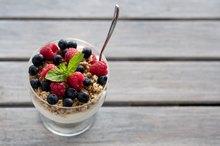How to Marinate Strawberries
Marinating strawberries is an easy way to rescue unripe berries, because the marinade adds both moisture and flavor. Marinated strawberries make a flavorful topping for pound cake, cheesecake or strawberry shortcake, and they shine when served simply in a parfait or topped with whipped cream or mascarpone cheese. Although strawberries are a fat-, sodium- and cholesterol-free food, with only 50 calories in eight medium berries, the marinade will increase the calories count. If you are counting calories, use only use only ripe, sweet berries, eliminate the sugar, and stick with citrus zest and juice or vinegar for flavor.
Rinse the strawberries well under cold, running water. Remove any leaves on top of the berries.
How to Freeze Nectarines
Learn More
Slice the berries from top to bottom into halves or quarters, depending on their size. Try to achieve a uniform size for the berries so that they absorb the same amount of marinade.
Place the strawberries in a medium bowl and sprinkle the sugar over them. Toss to make sure all of the berries are covered with the sugar. Cover the bowl with plastic wrap and place in the refrigerator for one hour.
How to Saute Bananas
Learn More
Add the citrus zest and marinating liquid of your choice to the berries. Recover the bowl and refrigerate for at least two hours.
Tips
Get creative with herbs and spices in your strawberries. Add some cinnamon or fresh vanilla to the berries while marinating, or toss with some freshly chopped spearmint or mint leaves before serving.
If you are trying to reduce the amount of white table sugar that you consume, use some brown sugar or corn syrup instead.
Warnings
Because strawberries possess a high moisture content, they can quickly develop mold, even if refrigerated. If any of your berries do develop mold, discard them rather than trying to cut the mold away. The U.S. Department of Agriculture’s Food Safety and Inspection Service cautions that mold that shows up on the surface of fruits may have contaminated it throughout, leaving the door open for those who consume them to develop respiratory problems or allergic reactions, or develop serious food-borne illness from mycotoxins.
Do not serve strawberries marinated in liqueur, wine or any other alcoholic beverage to children younger than 21.
Related Articles
References
- Quagliani D, Felt-gunderson P. Closing America's Fiber Intake Gap: Communication Strategies From a Food and Fiber Summit. Am J Lifestyle Med. 2017;11(1):80-85.
- Basu A, Rhone M, Lyons TJ. Berries: emerging impact on cardiovascular health. Nutr Rev. 2010;68(3):168-77.
- Kammeyer A, Luiten RM. Oxidation events and skin aging. Ageing Res Rev. 2015;21:16-29.
- Calvano A, Izuora K, Oh EC, Ebersole JL, Lyons TJ, Basu A. Dietary berries, insulin resistance and type 2 diabetes: an overview of human feeding trials. Food Funct. 2019;10(10):6227-6243.
- Törrönen R, Kolehmainen M, Sarkkinen E, Poutanen K, Mykkänen H, Niskanen L. Berries reduce postprandial insulin responses to wheat and rye breads in healthy women. J Nutr. 2013;143(4):430-6.
- James LJ, Funnell MP, Milner S. An afternoon snack of berries reduces subsequent energy intake compared to an isoenergetic confectionary snack. Appetite. 2015;95:132-7.
Resources
Tips
- Get creative with herbs and spices in your strawberries. Add some cinnamon or fresh vanilla to the berries while marinating, or toss with some freshly chopped spearmint or mint leaves before serving.
- If you are trying to reduce the amount of white table sugar that you consume, use some brown sugar or corn syrup instead.
Writer Bio
After attending Fairfield University, Hannah Wickford spent more than 15 years in market research and marketing in the consumer packaged goods industry. In 2003 she decided to shift careers and now maintains three successful food-related blogs and writes online articles, website copy and newsletters for multiple clients.









